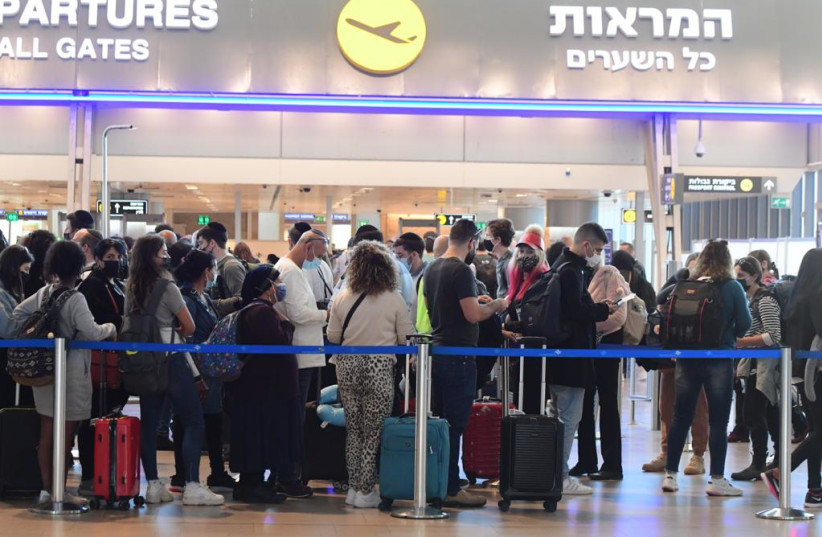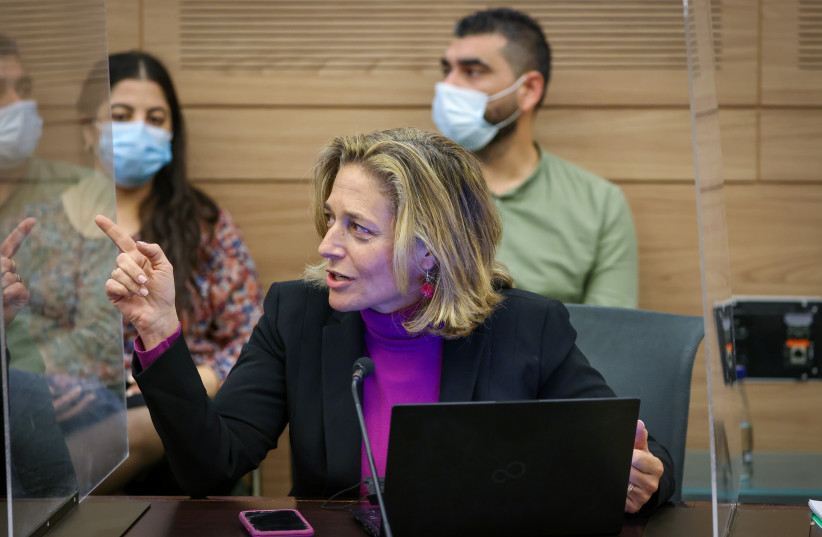A second case of the Omicron COVID-19 variant was discovered in Israel on Sunday, The Jerusalem Post confirmed, as new restrictions began to be implemented and authorities asked the public for patience while reassuring citizens the situation was under control.
A first case of the variant was announced by the Health Ministry over the weekend, leading the government to swiftly shutter the airport to foreigners and roll out additional travel and other restrictions, including requiring fully vaccinated Israelis entering the country to quarantine for three days.
The government approved on Sunday the employment of tracking technology used by the Shin Bet (Israel Security Agency) to locate people exposed to anyone infected with the Omicron variant. The measure is set to expire on Thursday.
Overall, 13 cases were being investigated on Sunday. Authorities were also still working on locating 12 out of 28 passengers who traveled to Eilat on the same bus with the woman identified as the first person infected with the variant in Israel, Head of Public Health Services Dr. Sharon Alroy-Preis said during Sunday’s meeting of a Knesset Law and Constitution Committee.
The bus traveled on the 390 line operated by Egged. It left Tel Aviv at 2:30 p.m. on Monday, November 22.

On Sunday, the government and the Knesset approved the COVID recommendations made by the coronavirus cabinet late Saturday night, which in addition to the travel restrictions and Shin Bet tracking, included requiring events with as few as 50 people to adhere to the Green Pass outline.
“Restrictions on the state’s borders are not an easy step, but they are a temporary and necessary step,” Prime Minister Naftali Bennett said at the opening of the weekly cabinet meeting.
He added that the needs of the affected industries, tourism and aviation, would be taken into consideration.
“What I ask of the public are patience and discipline,” Bennett further said. “I understand the fatigue of life in the shadow of the coronavirus. I hear people telling me, ‘We just came out of Delta and now a new strain has arrived.’ It’s not easy for anyone, but it’s the reality.
“Our mission as a government is to allow for life to continue as normal as possible,” the prime minister said.
To help manage the airports, the country appointed Brig.-Gen. Shmuel Zakai to replace former coronavirus commissioner for the airport Roni Numa. Zakai will help ensure that coronavirus procedures decided upon by the government are carried out at the airport.

In addition, Yoav Oren of the Airports Authority, will not serve as coronavirus commissioner for international land travel.
During the Knesset Committee, Alroy-Preis said one of the problems with tourists is that the Health Ministry often does not succeed in contacting them if their PCR test is positive, as was the case of the woman who traveled to Eilat after arriving from Malawi.
Later in the day, Health Minister Nitzan Horowitz and other senior health officials sent a reassuring message to the public during a press briefing.
“We are prepared for this scenario,” Horowitz said. “The matter is under control. There is no reason for anxiety or panic.”
Alroy-Preis also said the first information coming from South Africa seems to suggest that the disease caused by the variant is mild, at least among the vaccinated.
Meanwhile, the number of new coronavirus cases in Israel has remained low.
There were only 170 people diagnosed with the virus over Shabbat, the Health Ministry reported Sunday morning. Some 125 people are in serious condition, including 72 who are intubated.
Health officials have been monitoring the country’s reproduction rate or “R,” and reporting an increase in the rate of infection. However, the R fell slightly over the weekend from 1.08 to 1.05 on Sunday morning.
The R signifies the number of people a sick person will infect. Experts understand that it must hold under 1 to ensure the virus is not spreading.
Despite the low number of cases, the virus is continuing to circulate. The coronavirus ward was reopened at Ziv Medical Center in Safed on Sunday, the hospital said.
Two patients are in serious condition and two in critical condition. None of them were vaccinated.
The Omicron variant comes at a pivotal time for Israel, which just launched its nationwide children’s vaccination campaign last week. So far, about 35,000 children between the ages of five and 11 have been vaccinated and around the same number of appointments have been booked. In other words, only around 7% of eligible kids are inoculated or registered to be, although the health funds reported about a 10% increase this week over last.
Meanwhile, the number of cases of the Omicron variant continues to spike across the world and especially in Africa.
Cases were identified in the United Kingdom, Germany, Italy, Belgium, Hong Kong and Australia, among other places.
Alroy-Preis said the ministry continues to monitor the situation in all countries daily and is ready to add other countries to the list of those under travel ban if needed.
In South Africa, where the variant was first identified, there has been a striking increase in cases, according to data provided by the Reuters coronavirus tracker. The average number of new infections reported each day in South Africa rose by more than 3,900 over the last three weeks.
COVID-19 infections are increasing in South Africa, with 4,196 new infections reported on average each day, the tracker showed.
There have been 2,958,548 infections and 89,791 coronavirus-related deaths reported in the country since the pandemic began.
In all of Africa, there have been 8,713,000 cases recorded and 223,000 COVID-related deaths. But the country has low rates of coronavirus testing, so health experts assume the numbers are inaccurate.
Vaccination rates are extremely low in Africa, which has led to the development of several variants. In some countries, less than 1% of citizens have been inoculated.
